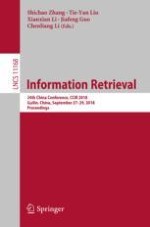2018 | OriginalPaper | Buchkapitel
Finding High-Quality Unstructured Submissions in General Crowdsourcing Tasks
verfasst von : Shanshan Lyu, Wentao Ouyang, Huawei Shen, Xueqi Cheng
Erschienen in: Information Retrieval
Aktivieren Sie unsere intelligente Suche, um passende Fachinhalte oder Patente zu finden.
Wählen Sie Textabschnitte aus um mit Künstlicher Intelligenz passenden Patente zu finden. powered by
Markieren Sie Textabschnitte, um KI-gestützt weitere passende Inhalte zu finden. powered by
